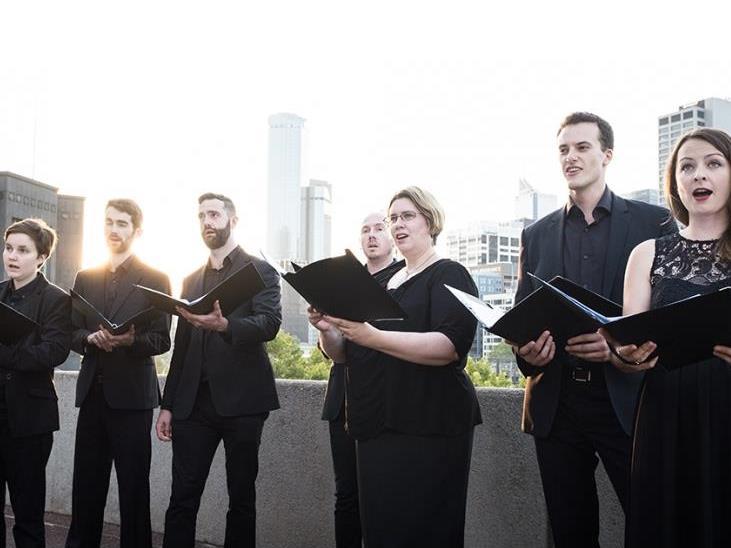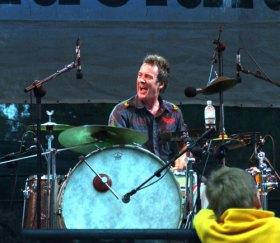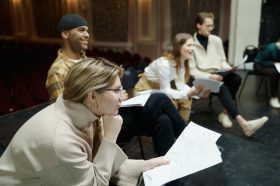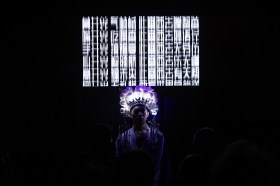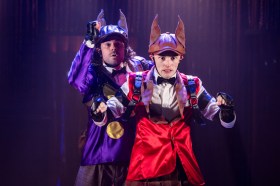Image: The consort of Melbourne via Melbourne Recital Centre.
We should be grateful that the ’world’s most liveable city’ is home to such an excellent vocal ensemble. Comprising a core of eight well-known local vocalists including its director Steven Hodgson, the group has developed a reputation for fine vocal blend and polished performances of rare (if not entirely unknown) repertoire and for its championing of new Australian work.
Thursday evening’s recital in the intimate space of the Melbourne Recital Centre’s Salon, announced as the ensemble’s last for this year, was no exception. The program was the last in the Consort’s ‘elements’ series that started in June last year with Flames Within. It explored through text and music several meanings of ‘earth’, both as symbol and actual environment: its flora and fauna, its seasons and the presence of the sacred with corresponding emotions.
The concert was book-ended by two expertly crafted folksong arrangements by Gustav Holst from his Six Choral Folksongs, Op 36B, written in 1916 when folksong was experiencing a revival in Britain. There was a tree is simple and strophic, but its arrangement was highly inventive, its song expertly exchanged between singers. I sowed the seeds of love similarly impressed for its close attention to rapport and phrasing. Next was Max Reger’s also strophic and chorale-like Unser lieben Frauen Traum from Acht geistliche Gesänge, Op 138, normally sung at Advent or Christmas. Here the ensemble’s fine blend of combined sound delighted as it swelled to reach its peak over the repeated words Hat er uns alle erlöst, an outpouring of gratitude for divine redemption.
Jumping back to the secular world, the performance of the outer movements of Ravel’s only unaccompanied choral composition Trois chansons (1914-15) appealed for their bitingly ironic wit in texts written by the composer. Notably they were the composer’s response to the horror of World War I, in which he served as a transport corps driver, also paying homage to the French Renaissance chanson. The tongue-twisting text of Ronde depicting the many and various demons in the woods of Ormonde was flawlessly executed.
The following work was composed by a member of the ensemble, Dan Walker. His evocative Elegy written in a country churchyard (1996) sets Thomas Gray’s best-known poem. English Renaissance William Byrd’s Terra tremuit skilfully displayed the theatrical word setting of the earth trembling, while Flemish Philippe de Monte’s Domine est terra of the same period presented a rare occasion to hear this composer’s rich polyphonic setting of Psalm 24, a hymn of praise for all creation. The latter work was broadly phrased and ambitiously slow in this revealing acoustic, perhaps with a need for more to be expressed within individual parts.
Australian composer Stephen Leek’s Red Earth, composed in 1997, somewhat unnecessarily accompanied by red lighting on this occasion, was conveyed with a true sense of sleepy, flat dryness with pulsating hints of didgeridoo overtones in upper voices. Franco-Flemish Cipriano de Rore’s five-part madrigal Hor che l’aria e la terra was well shaped, while Veljo Tormis’s Kord me tuleme tagasi (written in 1969) impressed for its relaxed spaciousness depicting an Estonian rural landscape at dusk. Ildebrando Pizzetti, well-known for his Requiem for unaccompanied voices, was an octogenarian when he composed his richly chromatic Il giardino di Afrodite in1961. The ensemble amply plumbed the decadent extremes of this setting of poetry attributed to Sappho.
The recital concluded with three sparse settings of the Song of Songs by contemporary English composer Ivan Moody whose music is always a mixture of quiet asceticism and heartfelt sincerity. The second setting simply used clusters of notes passing as drifting clouds in a blue sky. The last setting evoked the earth ultimately as Love.
An encore of a jazzy transcription of Bach’s Little Fugue in G minor, BWV 578 delighted an effusive audience.
I believe a venue with a more generous, softer acoustic would suit the ensemble better. Steven Hodgson being both singer and director presents a dilemma. When he directed from the front we missed his voice, but the ensemble gained from his more expressive direction. What is the remedy?
4 stars out of 5
The Consort of Melbourne
Katherine Norman, soprano
Kristy Biber, soprano
Miranda Gronow, alto
Hannah Pietsch, alto
Dan Walker, tenor
Christopher Roache, tenor
Lucien Fischer, bass
Steven Hodgson, bass and director
Presented by The Consort of Melbourne and Melbourne Recital Centre
Thursday, 17 August, 2017
Salon, Melbourne Recital Centre

